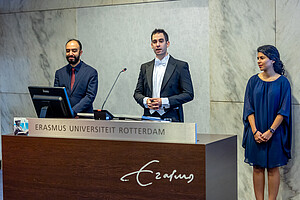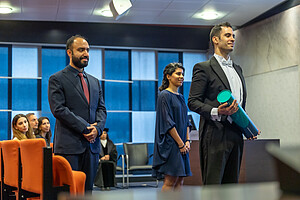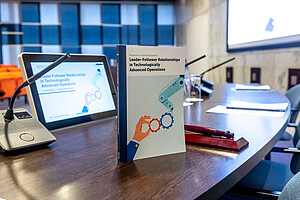PhD Defence Alexandros Pasparakis

In his dissertation, Leader-Follower Relationships in Technologically Advanced Operations, ERIM’s Alexandros Pasparakis The significant perks in a plethora of performance indicators fuel the adoption of new technological advancements in companies that seek competitive advantage. In these implementations, despite holding a key role in operations systems, human factors are oftentimes overlooked. In his dissertation, Leader-Follower Relationships in Technologically Advanced Operations, ERIM’s Alexandros Pasparakis delved into the field of operations management to examine the human factors in the leader-follower relationships that transcend traditional human-to-human contexts and emerge from novel human-robot interaction in collaborative order-picking setups. Through three studies, Alexandros concluded ways to design and implement advanced technologies to optimize human workers’ objective performance while considering their subjective experience.
Alexandros defended his dissertation in the Senate Hall at Erasmus University Rotterdam (EUR) on Thursday, 2 November at 10:30. His supervisors were Prof. dr. ir. René de Koster (RSM) and Dr. Jelle de Vries (RSM). Other members of the Doctoral Committee were Prof. dr. Ting Li (RSM), Prof. dr. Pascale Le Blanc (Eindhoven University of Technology), and Prof. dr. Christoph Glock (TU Darmstadt).
About Alexandros Pasparakis

Alexandros Pasparakis was born in Elis (Greece) on 19 November 1990. He received his diploma (B.Sc. & M.Sc.) in Civil Engineering with a Major in Transportation Planning and Engineering from the National Technical University of Athens (Greece) in 2014. He then fulfilled his military service obligations to the Hellenic Armed Forces in the Frontier Engineering Corps, before becoming a PhD candidate at Rotterdam School of Management, Erasmus University (The Netherlands) in September 2016. His research aims at elevating the human condition by incorporating behavioral factors in the design and implementation of advanced technologies for operations, transportation, and the supply chain. His research findings have been presented in various international conferences including INFORMS Annual meeting, Behavioral Operations Conference (BOC), Manufacturing and Service Operations Management Conference (MSOM), European Conference on Operational Research (EURO), and Netherlands Operations Management and Logistics Conference (NOML), as well as in industry talks including at Value Chain and the MHF at Toyota. He has been involved in coordinating and teaching several courses, and supervising students at master and bachelor levels. He has also served as a reviewer for Transportation Research Part E and Part F.
Thesis Abstract

Advanced technologies reshape operations at a staggering pace, with promises of lucrative improvements in a plethora of performance indicators, such as safety, speed, productivity, accuracy, and turnover. Companies that seek competitive advantage, however, often adopt new technologies without considering crucial human factors. Humans will remain an essential part of operations systems for the foreseeable future. As such we need to consider them when designing and implementing any advanced technology that affects their objective performance as well as their subjective experience. This dissertation includes three studies that deepen our understanding of human factors in terms of traditional and emerging leader-follower relationships, for the benefit of effectively designing and implementing advanced technologies within the field of operations management. Study 1 investigates a traditional hierarchical leader-follower relationship between a truck driver and his or her direct manager. It establishes the effect of safety-specific transformational leadership (SSTL) on the performance metrics of safe driving and driving productivity in long and short-haul truck cargo transport. Study 2 recognizes and investigates the novel leader-follower relationship that emerges during the interaction of humans with robots in collaborative order picking in warehouses. It empirically investigates this relationship and compares the objective performance outcomes of productivity and accuracy in two human-robot collaborative order picking setups (human leading the robot, human following the robot). Study 3 expands on the concept of human-robot collaborative order picking, and explores the effects that introducing this novel leader-follower relationship has on the subjective experience of human workers.
View photos of Alexandros's PhD Defence
Photos: Chris Gorzeman / Capital Images


